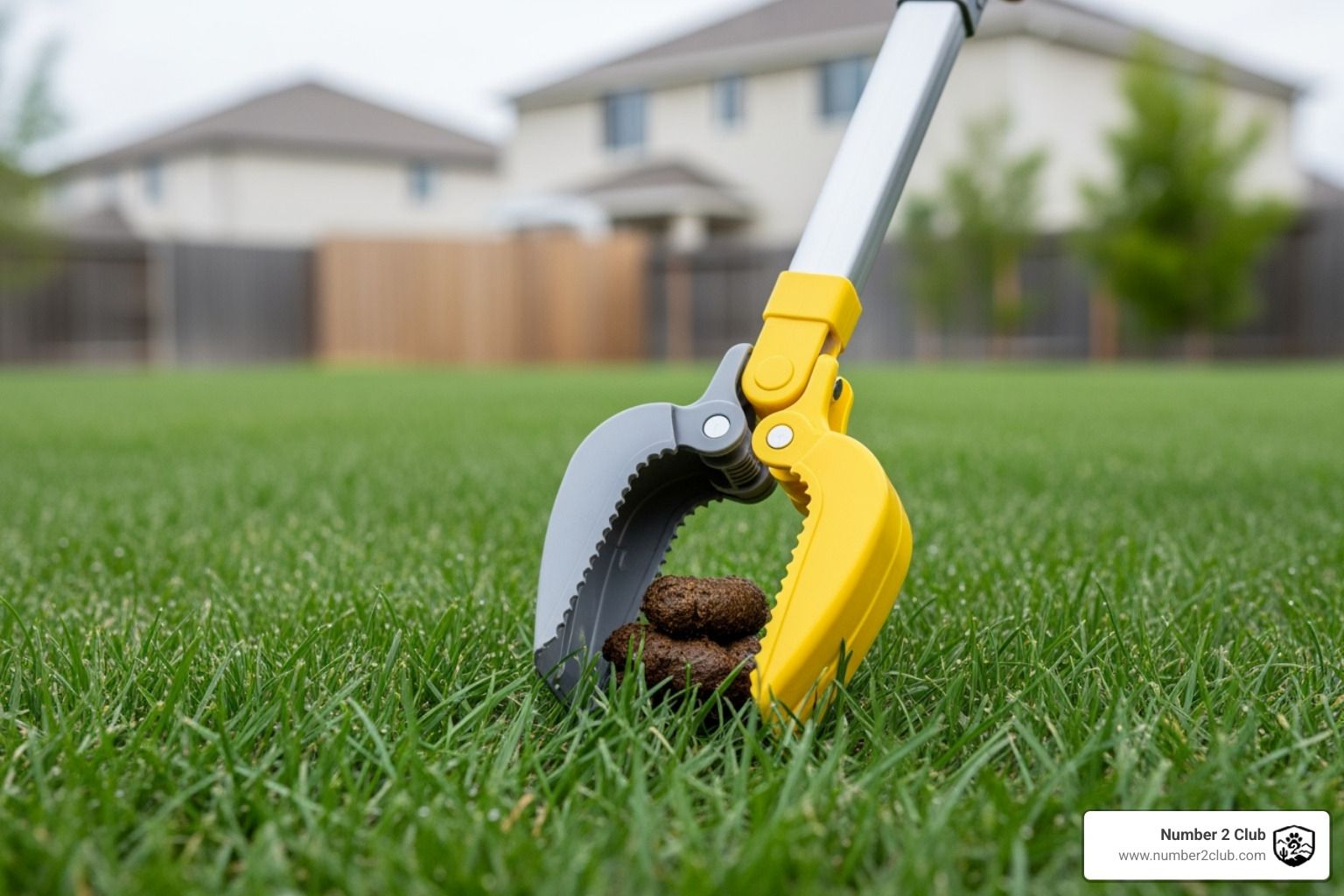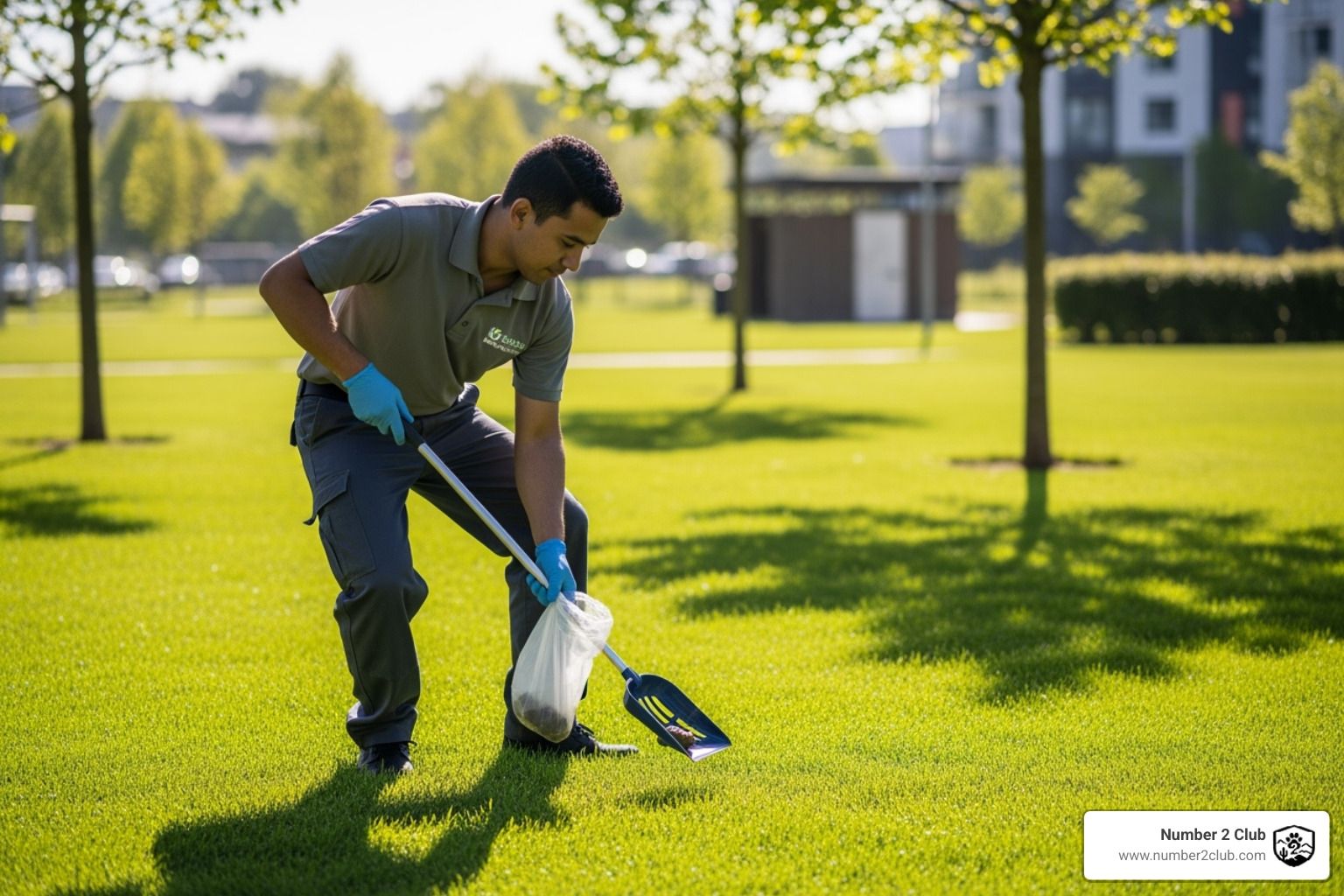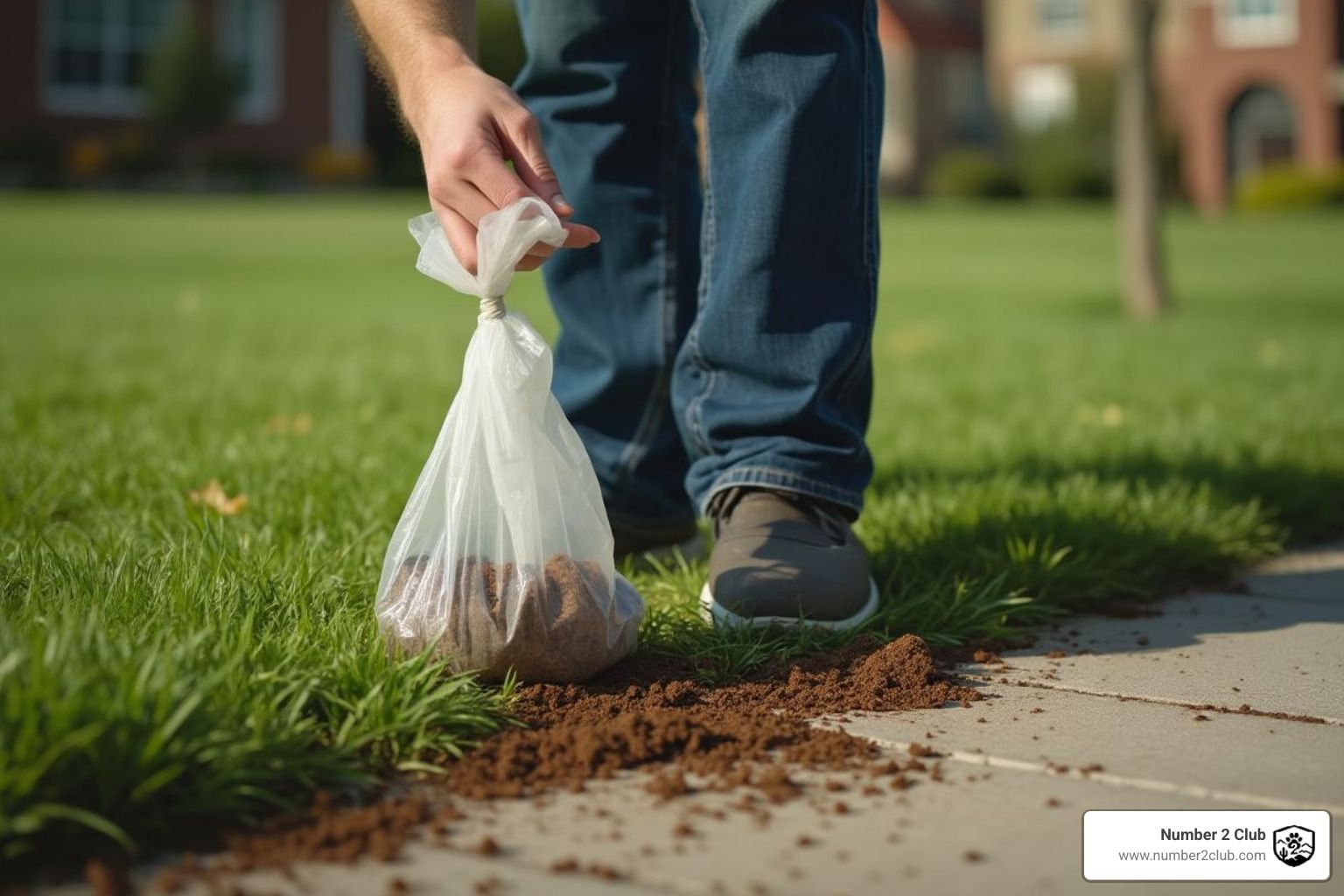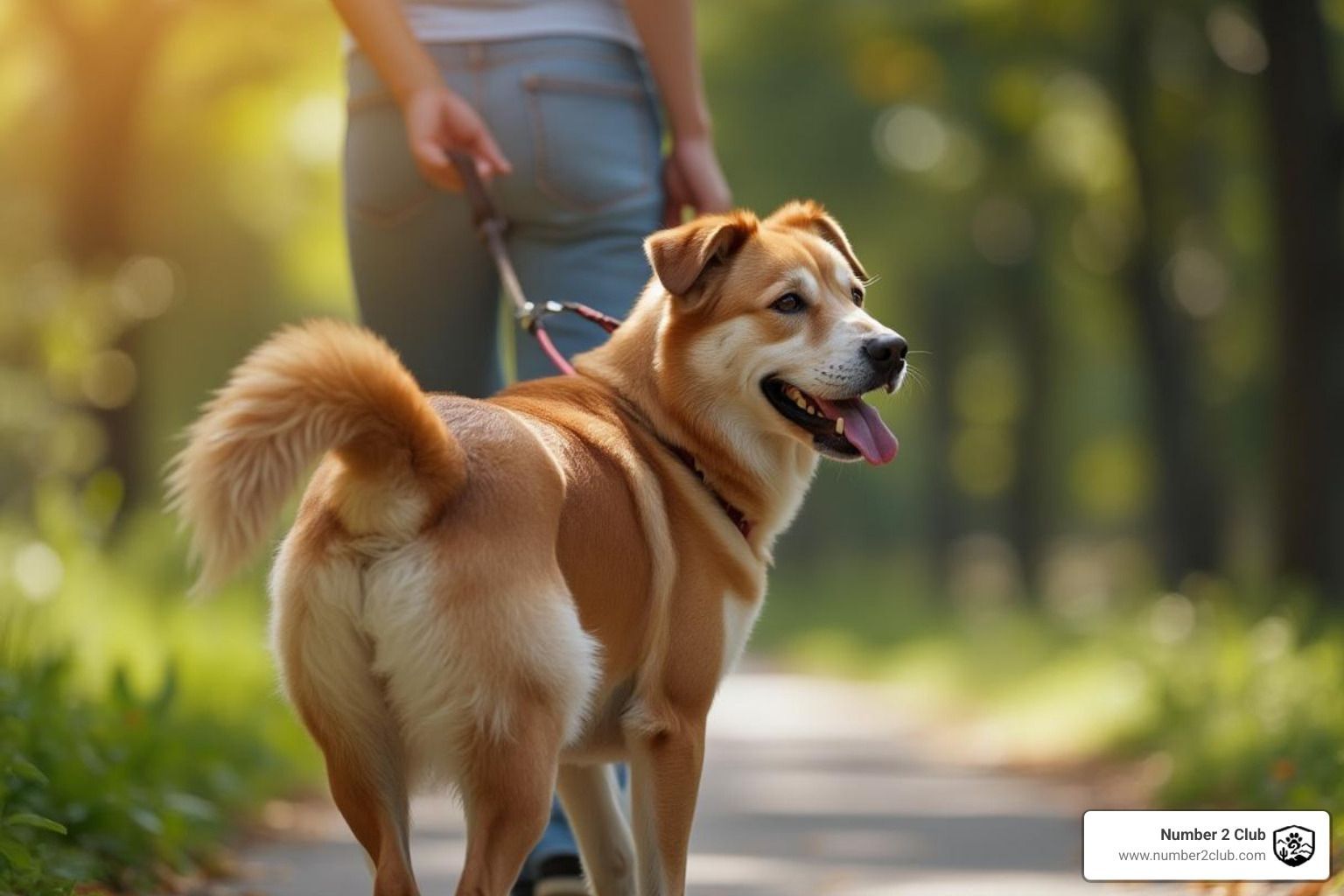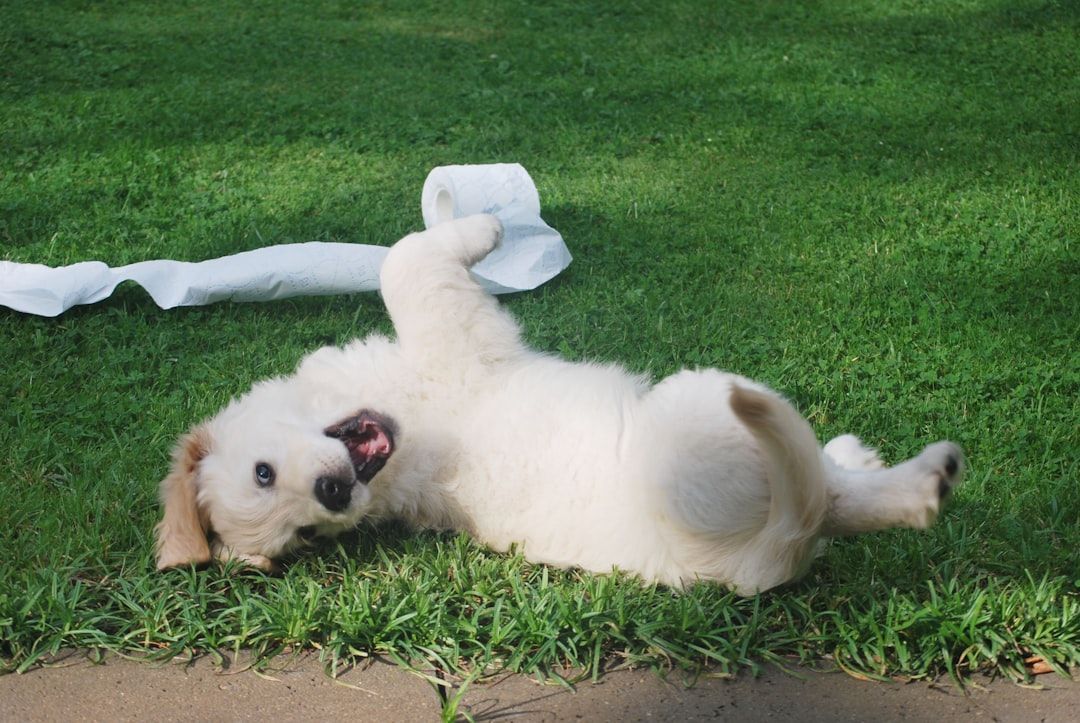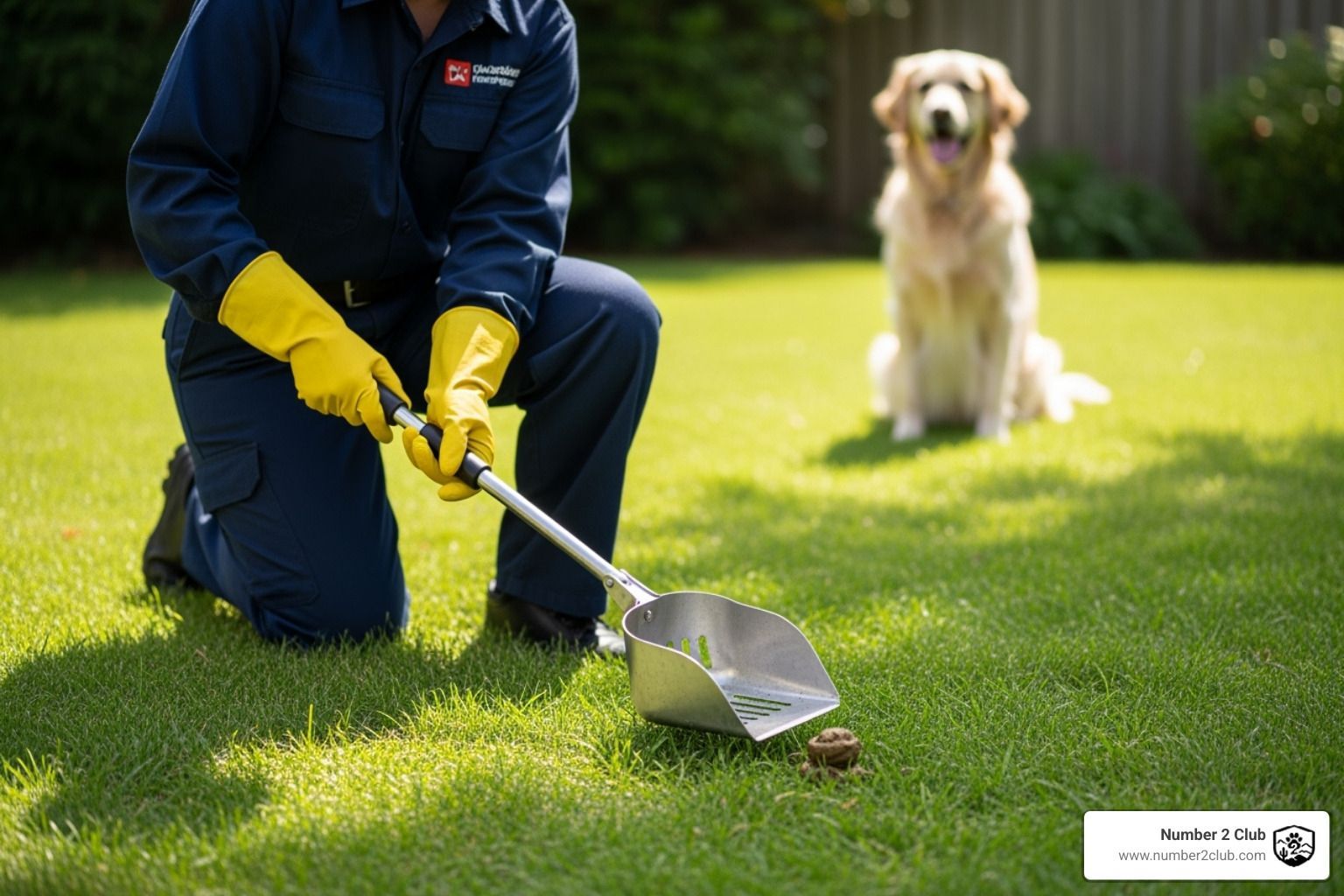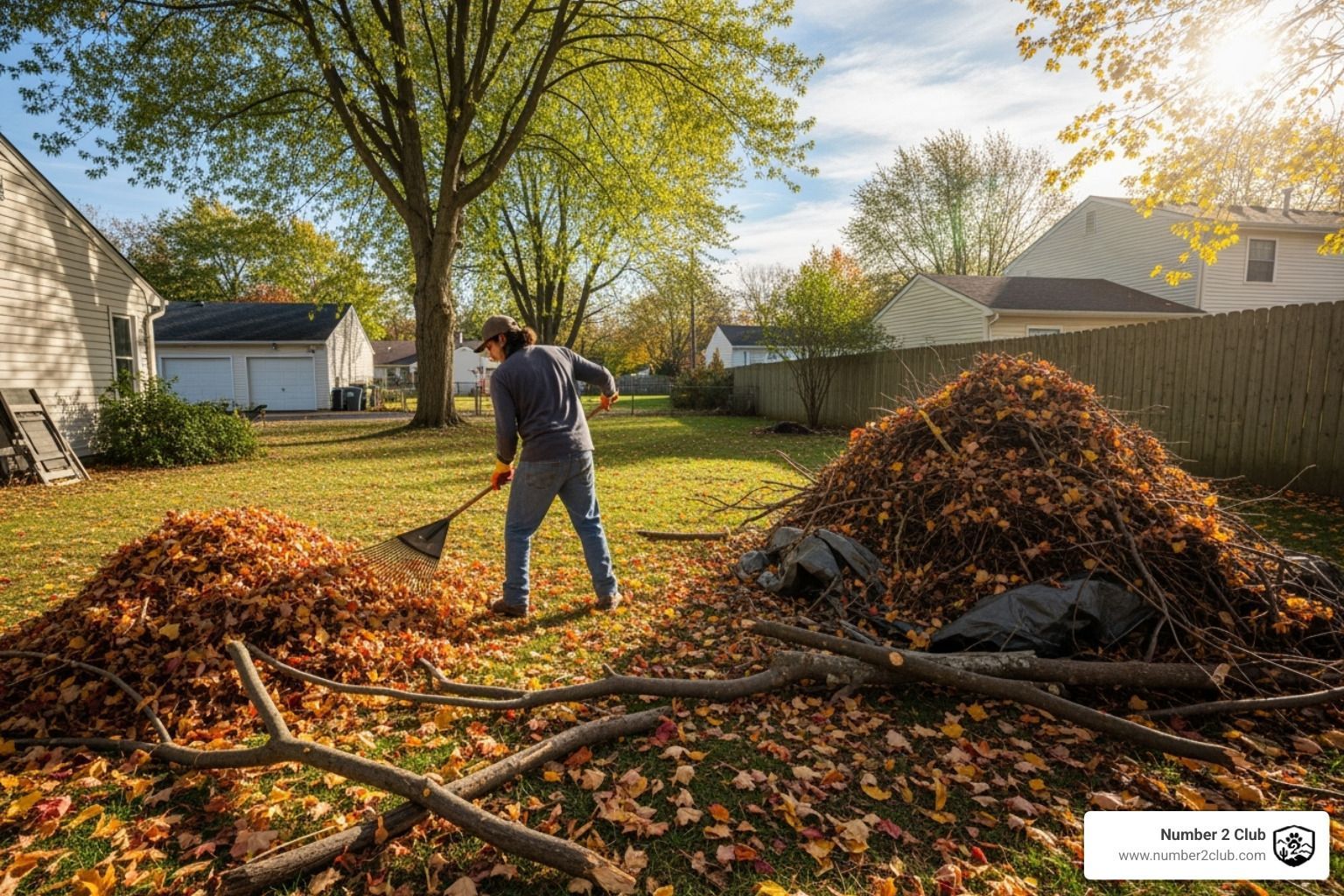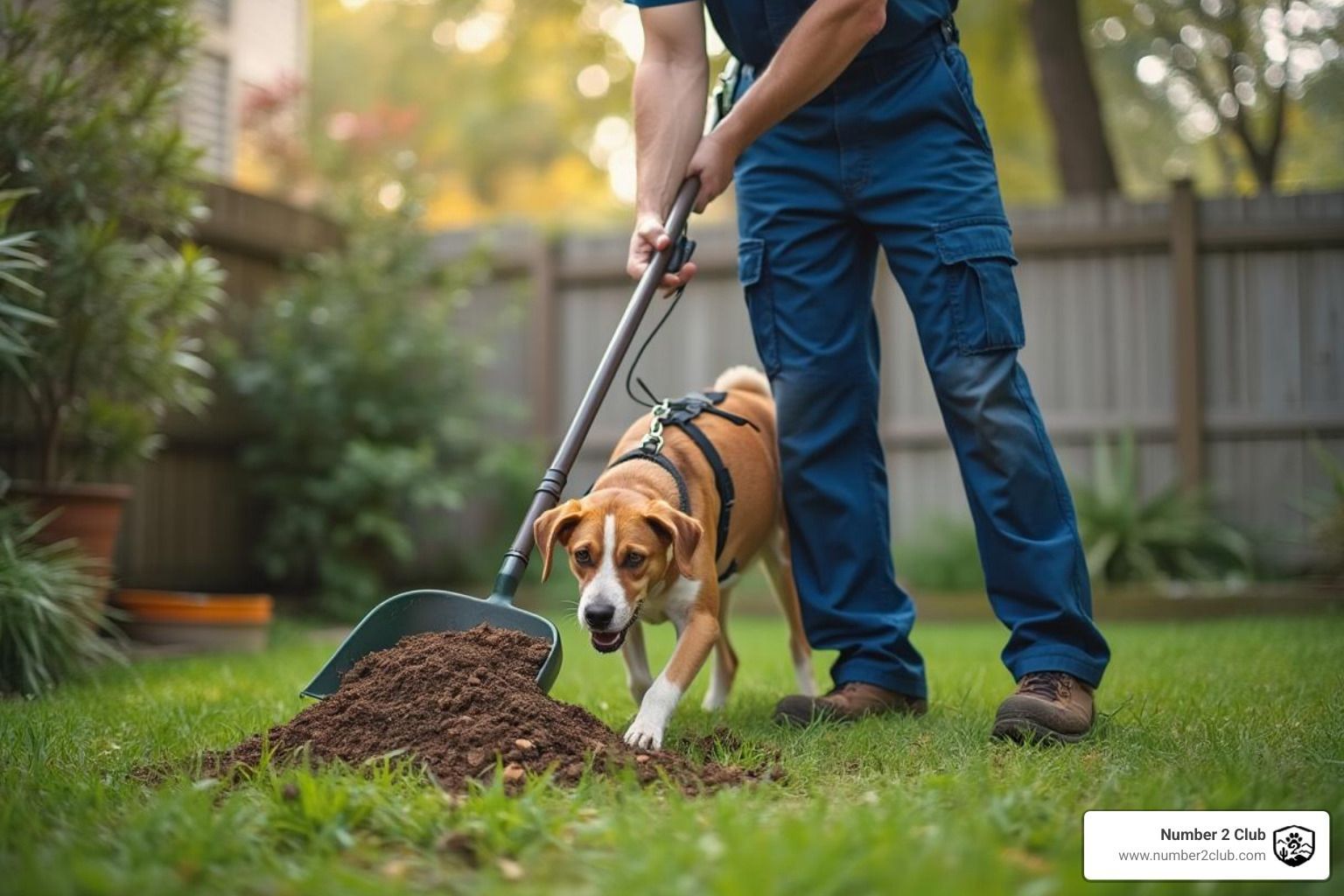Sustainable Scooping – Environmentally Friendly Dog Poop Disposal
Why Your Dog's Poop Matters More Than You Think
Picking up after your dog is a daily task for millions of pet owners. If you're looking for an eco friendly way to pick up dog poop, you're in the right place. Choosing the right method helps both the planet and your community.
Here are the top eco-friendly methods for dog poop disposal:
- Compostable Bags: These are made from plant-based materials and break down faster than regular plastic.
- Home Composting: With a special bin, you can safely turn dog waste into compost for non-edible plants.
- Waste Digesters: These systems work like mini septic tanks, breaking down poop underground.
- Scoop & Flush (No Bag): If your local rules allow, flushing unbagged waste can be an option.
- Non-Bag Tools: Using a pooper scooper or even old newspapers can help you avoid plastic bags.
This guide is brought to you by Joseph Lopez nc. As the founder of Number 2 Club, a premium dog poop scoop and pet waste removal company, I've spent years ensuring clean, safe, and odor-free outdoor spaces, always focusing on an eco friendly way to pick up dog poop for residential and commercial clients. We're dedicated to setting new industry standards through dependable and thorough cleanups.
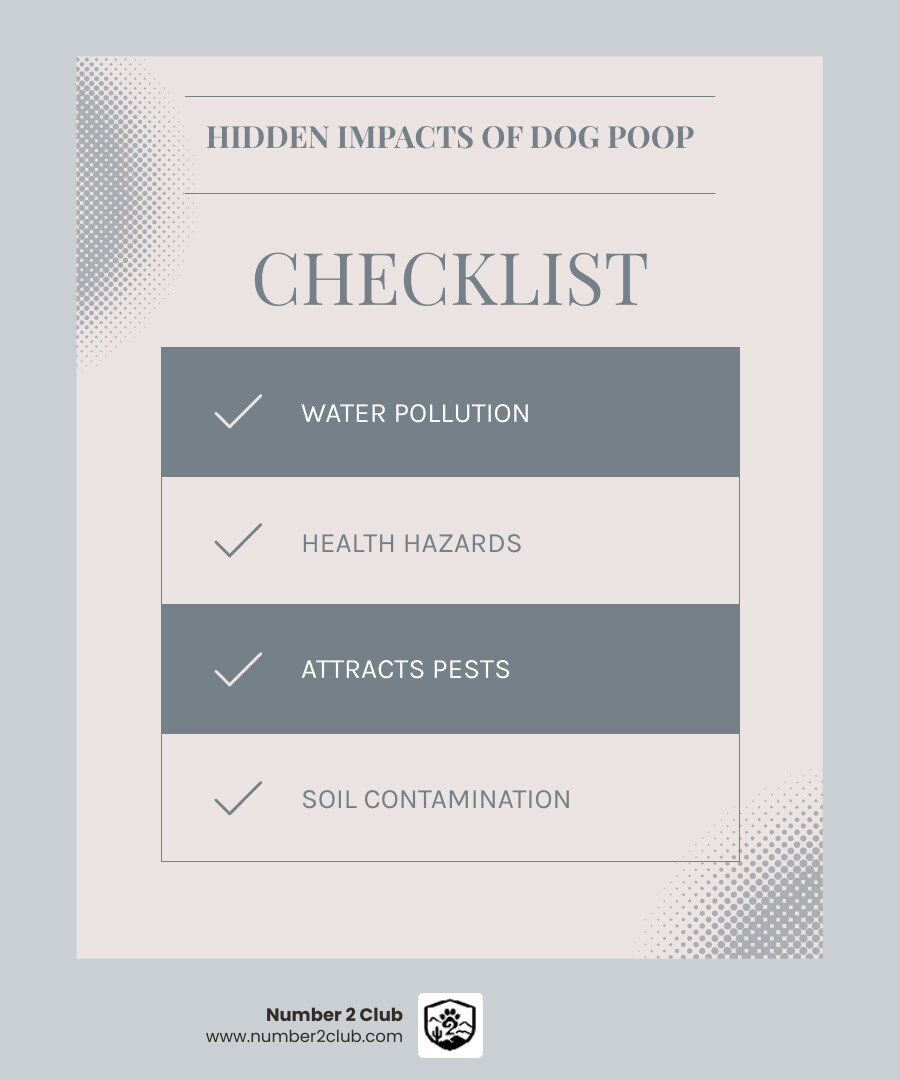
The Hidden Impact of Dog Waste on Our Environment and Health
We all adore our furry friends, right? They fill our lives with so much joy and love. But let's be honest, they also fill our yards with a lot of dog poop! It's a daily part of being a pet parent. A healthy dog can go to the bathroom once to three times a day. And with about 63.4 million U.S. homes having dogs, that's a lot of waste to deal with.
Sadly, it's thought that nearly half of pet owners don't clean up after their dogs. This oversight creates big problems for our environment and our health.
What are the environmental and health impacts of dog waste?
Dog poop isn't just an ugly mess; it's a real danger to our planet and our health. Unlike waste from wild animals, dog poop isn't a natural fertilizer. Our pampered pups have different diets. Their waste is full of bacteria and germs that can harm us and the environment.
When dog waste is left lying around, rain washes it away. It flows into storm drains and, eventually, into our lakes, rivers, and oceans. This dirty runoff pollutes our water. The U.S. Environmental Protection Agency (EPA) says it's a big deal. They estimate that just two or three days of waste from 100 dogs can put enough bacteria, nitrogen, and phosphorus into the water to close 20 miles of bay-watershed to swimming and fishing. It's no surprise that dog waste is the second biggest cause of bacteria in U.S. water systems!
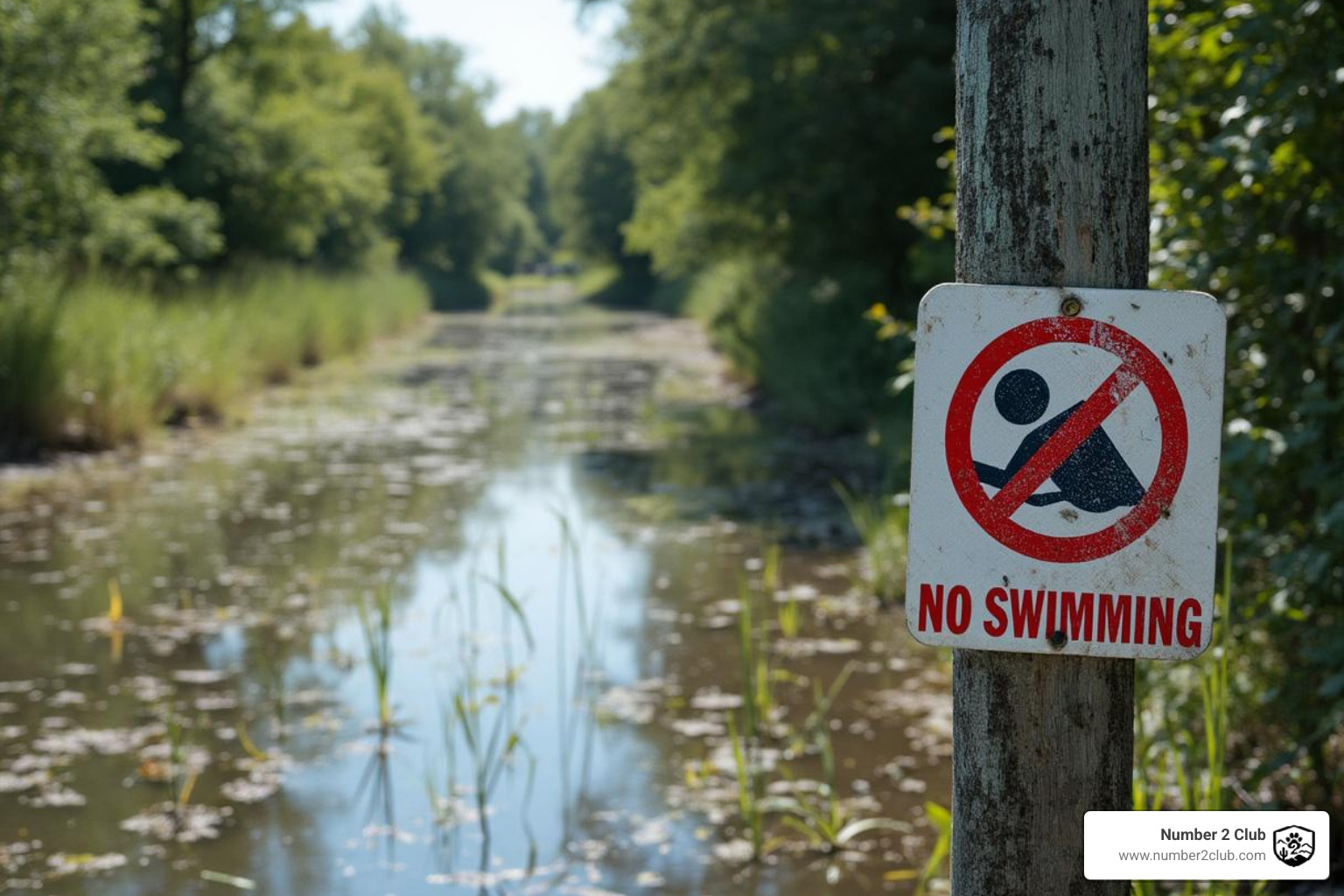
Beyond polluting our water, dog poop brings serious health risks. It's a breeding ground for many harmful germs that aren't found in human waste. This includes bacteria like E. coli and Salmonella. It also carries parasites such as tapeworm, hookworm, and roundworm. If not cleaned up properly, these germs can get into our soil and water. They can then spread diseases to people and other animals. This is why we also offer a full Yard Sanitizing and Deodorizing Service at Number 2 Club. We want to make sure your outdoor spaces are truly clean and safe. Dog poop can attract parasites and spread disease, so picking it up the right way is super important.
The Problem with Traditional Plastic Poop Bags
For a long time, the simple plastic bag has been the easy way to pick up dog waste. And yes, they are handy! But these everyday plastic bags cause a huge environmental headache. The poop inside, wrapped in plastic that won't break down, basically gets "mummified." This means it can't naturally decompose in landfills. Landfills don't have enough oxygen or sunlight for that to happen. Traditional plastic can take hundreds, even thousands, of years to break down. This just adds to our overflowing landfills.
What's even trickier is "greenwashing." Many products say they are "biodegradable" or "degradable" but aren't really. These bags, especially those called "oxo-degradable," don't truly disappear. Instead, they just break into tiny bits of plastic. These microplastics then pollute our soil and water. They can even get into the food chain, causing long-term harm to nature. The Federal Trade Commission (FTC) has even warned companies selling dog waste bags about these misleading claims, as highlighted in their FTC warning about mislabeled pet waste bags. In fact, in 2021, big companies like Target, Chewy, PetSmart, and Petco had to pay a total of $1.8 million in settlements in California for this very reason. This shows us how important it is to be smart shoppers and truly understand what makes an eco friendly way to pick up dog poop.
A Guide to the Best Eco-Friendly Way to Pick Up Dog Poop
Now that we understand the serious environmental and health impacts of dog waste, let's explore the solutions that actually work. The good news? There are plenty of effective alternatives to traditional plastic bags that won't harm our planet.
Choosing the right method really depends on your lifestyle. Do you live in an apartment or have a big backyard? Are you looking for something super convenient, or are you willing to put in a bit more effort for maximum environmental benefit? Whatever your situation, there's an eco friendly way to pick up dog poop that'll work for you.
If managing all this feels overwhelming, don't worry – professional services like our Dog Poop Yard Cleaning can handle the dirty work while ensuring responsible disposal methods.
Biodegradable and Compostable Bags: The Best Eco-Friendly Way to Pick Up Dog Poop
When it comes to bags, not all "green" options are created equal. Understanding the difference between biodegradable and compostable bags is crucial to avoid falling for greenwashing tricks.
Biodegradable bags sound great in theory, but they're often not much better than regular plastic. Many break down into tiny microplastics rather than disappearing completely. Others need specific conditions like sunlight and oxygen that don't exist in most landfills. So while they might decompose in 6 to 18 months under perfect conditions, they could still sit in a landfill for years.
Compostable bags are where things get interesting. These are made from plant-based materials like cornstarch and are designed to break down completely into natural elements. When you see the ASTM D6400 certification, you know you're getting a bag that meets commercial composting standards. These bags can break down in just 50-90 days in the right environment.
| Feature | Traditional Plastic Bags | Biodegradable Bags | Compostable Bags |
|---|---|---|---|
| Material | Petroleum-based plastic | Petroleum-based with additives, or plant-based | Plant-based (e.g., cornstarch, PLA) |
| Breakdown | Hundreds to thousands of years | Can break down faster (months to 18 months), but often into microplastics | Fully breaks down into natural elements |
| Conditions | Does not break down naturally in landfills | Requires specific conditions (oxygen, UV light) often absent in landfills | Requires specific composting conditions (commercial or home) |
| Microplastics | Yes | Often yes (especially oxo-degradable) | No |
| Certifications | None relevant for eco-friendliness | Often misleading or vague claims | Look for ASTM D6400 (for commercial composting) |
| Ideal Disposal | Landfill | Landfill (if no better option, but still problematic) | Commercial composting facilities or specialized home composters |
Here's the catch though – most composting facilities won't accept pet waste because of health concerns. So even your fancy compostable bag might end up in a landfill where it can't break down properly. The most eco-friendly approach? Separate the poop from the bag before disposal when possible.
Responsible Disposal and Composting Practices
Want to take your environmental commitment to the next level? Home composting is hands-down one of the most sustainable options available. Done correctly, it transforms waste into valuable soil amendment while keeping it out of landfills entirely.
But let's be clear – this isn't your typical kitchen scrap composting. Dog waste contains bacteria and parasites that require special handling and should never mix with compost intended for edible plants.
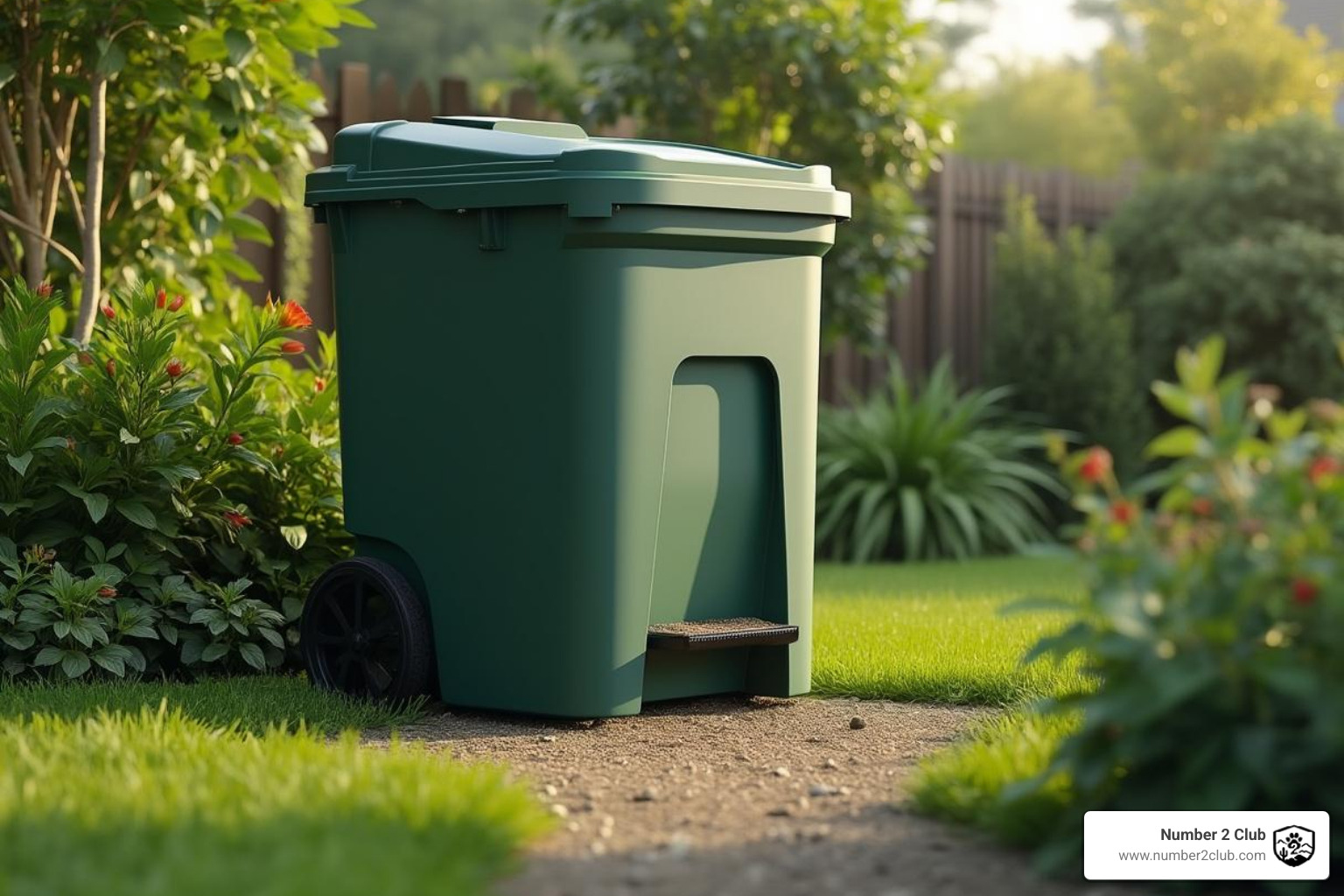
Setting up a dedicated pet waste composting system requires some planning but isn't complicated. You'll need a separate, enclosed area far from any water sources or vegetable gardens. The magic happens when you balance "greens" (nitrogen-rich materials like fresh grass clippings) with "browns" (carbon-rich materials like leaves or shredded newspaper), add moisture, and ensure good airflow.
Temperature is key here. Your compost needs to reach 140-160°F to kill harmful pathogens. When managed properly, the waste breaks down in six months to a year, creating nutrient-rich compost that's perfect for ornamental plants, trees, and flower beds.
Dog waste digesters offer a more hands-off approach. These underground systems work like mini septic tanks, using water and enzymes to break down waste into harmless liquid that enriches your soil. Just add the poop, water, and enzymes regularly, and let the system do its work.
For apartment dwellers or those wanting something different, worm composting is surprisingly effective. Red wiggler worms can process dog waste when given plenty of carbon-rich materials like shredded cardboard. The resulting worm castings make excellent fertilizer for non-edible plants. Just wait a couple weeks after any deworming treatments before adding waste to avoid spreading parasites.
The USDA provides detailed guidance on safe dog waste composting practices, which is invaluable for getting started safely. For larger properties, our Backyard Dog Poop Cleaning services can incorporate these advanced disposal methods.
Other Alternatives: Paper and Scoopers
Sometimes the best solutions are the simplest ones. Before plastic bags took over, people managed just fine with basic tools and materials that are still perfectly effective today.
Old newspapers make excellent poop scoopers and are completely biodegradable. Grab a few sheets, scoop up the waste, fold it up, and toss it in the trash. Junk mail works too! Some companies now offer recycled paper bags specifically for pet waste, giving you the convenience of pre-made bags with the environmental benefits of paper.
Pooper scoopers are game-changers, especially for backyard cleanup. A good, durable scooper lets you pick up waste and transfer it directly to your composter, digester, or trash without using any bags at all. It's a one-time investment that eliminates single-use bags from your routine entirely.
For those with larger yards, a simple shovel and dedicated bucket system works wonderfully. Keep a covered bucket specifically for pet waste, scoop directly into it, then empty it into your chosen disposal method regularly. No bags needed, no fuss.
These bag-free methods represent the most straightforward eco friendly way to pick up dog poop, particularly for home use. If you'd rather have professionals handle your yard maintenance using these responsible methods, our Pooper Scooper Service provides efficient, environmentally conscious cleanup that keeps your outdoor spaces pristine.
Common Mistakes to Avoid in Dog Poop Disposal
Even with the best intentions, it's easy to make a few slip-ups when it comes to being truly eco-friendly with our dog's waste. Knowing what not to do is just as important as knowing what to do! Let's explore some common pitfalls so you can avoid them.
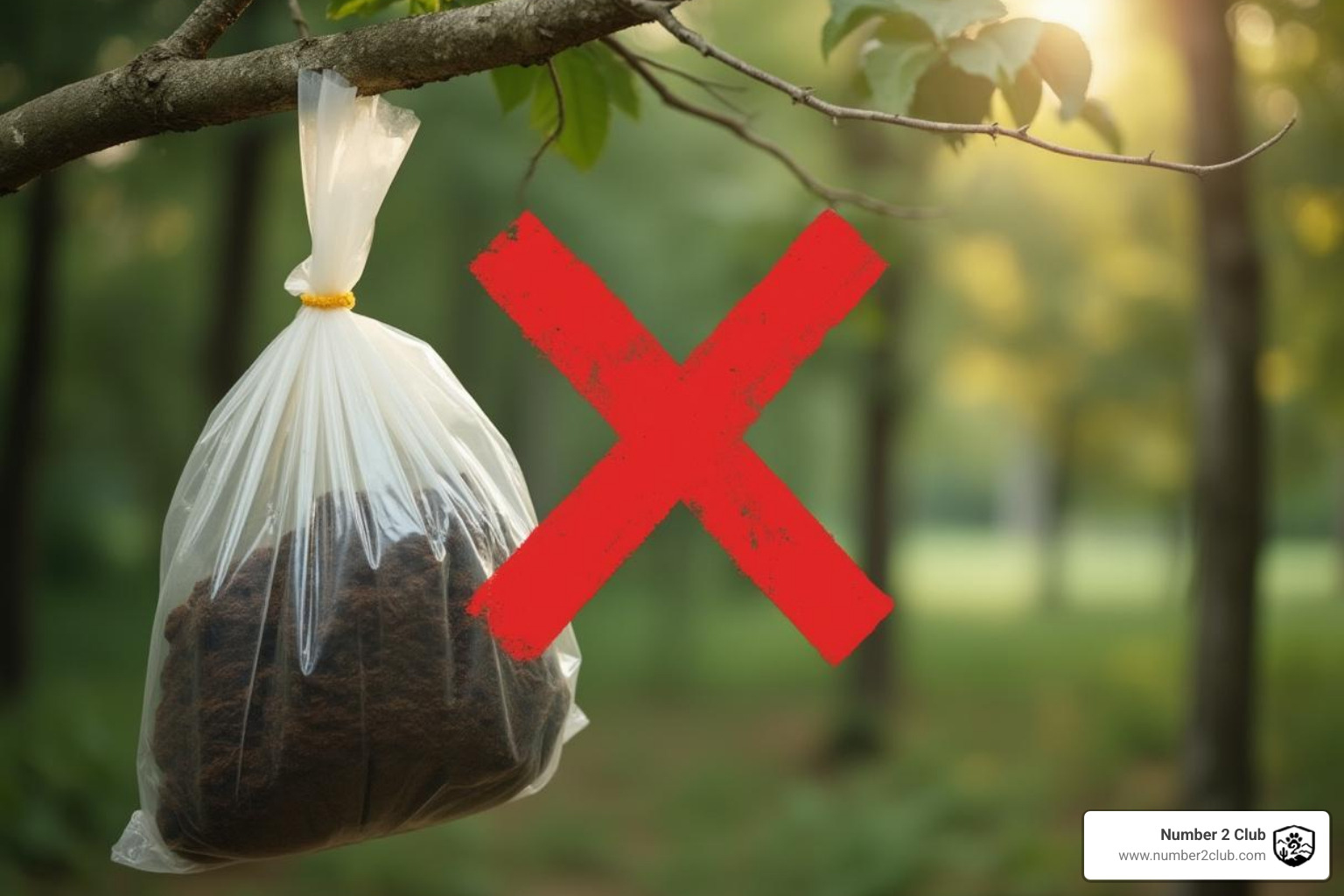
First and foremost, the biggest mistake is leaving dog poop uncollected. This is the most basic rule of dog ownership. Whether it's in your own yard, at the park, or on a hiking trail, uncollected dog poop is a major source of pollution. It contaminates our water, spreads disease, and frankly, it's just plain rude to others trying to enjoy the space.
Then there's the infamous "bag and abandon" move. We've all seen it: a perfectly tied-up plastic bag of poop left on the side of a trail, hanging from a tree branch, or tossed into the bushes. This is actually worse than leaving the poop unbagged! Now, you've got both the raw waste and a non-biodegradable plastic bag polluting the environment. That plastic will stick around for hundreds of years, and the poop inside won't break down naturally. It completely defeats the purpose of trying to be an eco friendly way to pick up dog poop.
Another common misconception is that it's okay to flick poop near water sources. Some folks think that tossing the poop off the path into the woods or undergrowth is fine. While it might seem better than leaving it on the trail, if it's anywhere near a stream, river, or lake, that waste can still wash directly into the water. This adds to the pollution and health risks we talked about earlier. Even in the countryside, it’s best to remove it entirely rather than just flicking it.
While flushing unbagged dog poop can sometimes be an eco friendly way to pick up dog poop, it's not always safe or suitable. Many city wastewater treatment systems aren't designed to handle the specific germs found in dog waste. Plus, flushing uses extra water, which isn't ideal for saving resources. Always double-check your local rules and make sure your home plumbing can handle it to avoid clogs or contamination.
Lastly, be very careful about composting incorrectly or using dog waste compost on vegetable gardens. As we've stressed, composting dog poop needs a special system and careful handling. Using compost made from dog waste on any plants you plan to eat – like fruits, vegetables, or herbs – is a big no-no. There's a real risk of spreading parasites and bacteria. It's also super important that your compost gets hot enough to kill off those harmful pathogens.
Avoiding these common mistakes is key to truly embracing an eco friendly way to pick up dog poop. If you'd rather leave the dirty work to the pros, our Dog-Friendly Cleaning Service ensures that all waste is handled correctly and responsibly, preventing these mistakes from occurring on your property.
Frequently Asked Questions about Eco-Friendly Dog Poop Disposal
We get it! Making the switch to an eco friendly way to pick up dog poop can bring up a few extra questions. You're doing a great job thinking about these details! Let's tackle some of the most common ones together.
How long does it take for a biodegradable poop bag to decompose?
This is a fantastic question, and the answer can be a little tricky because it really depends on what kind of "biodegradable" bag you're talking about, and where it ends up! Some bags might claim to be biodegradable, but they can still take a very long time – from a few months up to a year and a half, or even more.
The biggest factor is the environment. If a "biodegradable" bag lands in a typical landfill, it's a bit like putting it in a time capsule. Landfills don't have much oxygen or sunlight, which are super important for things to break down. So, that bag (and the poop inside!) can sit there, pretty much "mummified," for a very long time.
Now, truly compostable bags are a different story. If they meet standards like ASTM D6400, they're designed to break down much faster, often within 50 to 90 days. But here's the catch: that's usually in a commercial composting facility. These places have special conditions like high heat and lots of microbes that really get the job done. If a compostable bag ends up in a regular landfill, it will also struggle to break down. This is why knowing the difference is key to truly finding an eco friendly way to pick up dog poop.
Is it safe to flush dog poop down the toilet?
This is a really common question, and it's a bit of a "yes, but..." situation! The U.S. EPA actually suggests that flushing pet waste can be a good option for the environment. Why? Because wastewater treatment plants are specifically designed to clean water and handle harmful germs.
However, it's not always a clear-cut answer. First, you must check your local rules. Some cities and towns have specific laws about flushing dog waste. Their sewage systems might not be set up to handle the specific types of bacteria and parasites found in dog poop. For example, some areas don't allow it at all.
Also, think about your own home's plumbing. Flushing a lot of dog waste can sometimes lead to clogs or other issues, especially if your pipes are older or narrower. And a huge, important rule: never, ever flush any kind of bag, even if it claims to be "flushable." These bags can cause serious problems for your pipes and the local sewage system.
So, while flushing unbagged dog poop can sometimes be an eco friendly way to pick up dog poop, it's super important to do your homework first. Call your local water authority, or check their website, to make sure it's allowed and safe in your area.
Can I put dog poop in my regular compost bin?
Big, resounding NO! Please, do not put dog poop in your regular compost bin, especially if you plan to use that compost on your vegetable garden or other edible plants.
Here's why: Dog poop is full of various harmful bacteria (like E. coli) and parasites (like roundworm, hookworm, or tapeworm). If these get into your garden soil and then onto your food, they can pose serious health risks to you and your family.
For dog waste to be safely composted, it needs to get really hot – we're talking temperatures between 57 and 71 degrees Celsius (that's 135 to 160 degrees Fahrenheit!). Ideally, it should even reach 73 degrees Celsius (163 degrees Fahrenheit) to truly kill off those nasty pathogens. Most backyard compost bins just don't get hot enough to consistently reach and maintain these temperatures.
So, if you're serious about composting dog waste, you absolutely need a separate, dedicated system for it. And even then, the finished compost should only be used on non-edible plants, like your ornamental flowers, trees, or shrubs. Keeping it separate is the safest and smartest eco friendly way to pick up dog poop when it comes to composting.
Conclusion: Making the Greenest Choice for You and Your Pet
As pet parents, we all want the best for our furry friends, and that includes doing our part for the planet they zoom around on! Throughout this guide, we've taken a deep dive into why handling dog waste responsibly is so much more than just a chore – it's a crucial step towards protecting our environment and community health. We've uncovered the hidden impacts of dog waste, from polluting our precious waterways to spreading unseen pathogens. And we've learned to spot the greenwashing tricks, understanding the real difference between truly compostable and misleading "biodegradable" bags.
But here’s the good news: you have so many fantastic options when it comes to choosing an eco friendly way to pick up dog poop! Whether it's embracing genuine compostable bags that break down into natural elements, setting up a clever home composting system or waste digester, or even going bag-free with simple tools like old newspapers or a trusty scooper, every effort makes a significant difference. The "best" method truly depends on your unique lifestyle and where you live – perhaps you're in a busy city apartment, or maybe you have a sprawling rural yard. No matter your situation, there's a sustainable choice that fits your commitment level.
Every single time you choose a greener option for dog waste disposal, you're not just cleaning up after your pet; you're actively contributing to cleaner water, healthier soil, and a safer community for everyone. It’s about making a positive ripple effect, one scoop at a time!
And if the thought of managing it all feels a bit overwhelming, or you simply want to reclaim your precious time, there's an even easier solution. For a completely hands-off and professional approach, consider a Dog Waste Removal service from Number 2 Club. We're here to keep your yard sparkling clean and safe, ensuring all waste is handled responsibly so you can focus on enjoying those happy moments with your beloved pet, knowing you’re still making the greenest choice.


